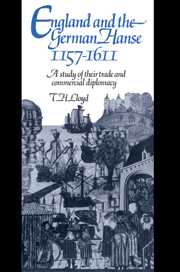Book contents
- Frontmatter
- Contents
- List of tables
- List of abbreviations
- Introduction
- 1 The winning of the Hanse franchises, 1157–1361
- 2 The English challenge, 1361–1399
- 3 Jockeying for advantage, 1400–1437
- 4 Trade, piracy, war, 1437–1474
- 5 Rivalry at Antwerp, 1474–1551
- 6 The loss of the Hanse franchises, 1551–1611
- Conclusion
- Appendix 1 Gildhall certificates
- Appendix 2 Hanse trade figures in the late fifteenth century
- Appendix 3 Elizabethan cloth exports
- Appendix 4a English cloth dyed at Hamburg, 1535–1612
- Appendix 4b English cloth forwarded from Hamburg without local handiwork 1568–1605
- Bibliography
- Index
1 - The winning of the Hanse franchises, 1157–1361
Published online by Cambridge University Press: 18 December 2009
- Frontmatter
- Contents
- List of tables
- List of abbreviations
- Introduction
- 1 The winning of the Hanse franchises, 1157–1361
- 2 The English challenge, 1361–1399
- 3 Jockeying for advantage, 1400–1437
- 4 Trade, piracy, war, 1437–1474
- 5 Rivalry at Antwerp, 1474–1551
- 6 The loss of the Hanse franchises, 1551–1611
- Conclusion
- Appendix 1 Gildhall certificates
- Appendix 2 Hanse trade figures in the late fifteenth century
- Appendix 3 Elizabethan cloth exports
- Appendix 4a English cloth dyed at Hamburg, 1535–1612
- Appendix 4b English cloth forwarded from Hamburg without local handiwork 1568–1605
- Bibliography
- Index
Summary
A legal compilation commonly termed the Billingsgate tolls shows that subjects of the Emperor (homines imperatoris) were trading in London about the year AD 1000. In addition to the regular city tolls they paid the king certain specific dues at Christmas and Easter, in return for which he gave the same protection to their possessions as natives enjoyed. The privilege, no matter how limited, and the discharge of an apparently collective obligation suggests some degree of organisation on the part of these merchants. The only townsmen from within the Empire specifically mentioned in this source are those from the Meuse settlements of Huy, Liège and Nivelles, none of which was ever a member of the later German Hanse. However, the implication is that all imperial subjects shared the privilege and doubtless men from other German towns also came to England at this date. The next evidence survives in a miscellaneous collection put together between 1206 and 1216, which portrays conditions existing in London a century or more earlier. Formerly, historians dated its first compilation to about 1130, but a more recent analysis suggests an eleventh-century date. One manuscript begins with the statement that these were the laws of the men of Lorraine; another shows that they were applicable to all subjects of the Emperor and, possibly, in general terms to all aliens. The laws were intended to define the rights and duties of merchants who arrived by way of the Thames, which must have been the most frequently used route.
- Type
- Chapter
- Information
- England and the German Hanse, 1157–1611A Study of their Trade and Commercial Diplomacy, pp. 13 - 49Publisher: Cambridge University PressPrint publication year: 1991



